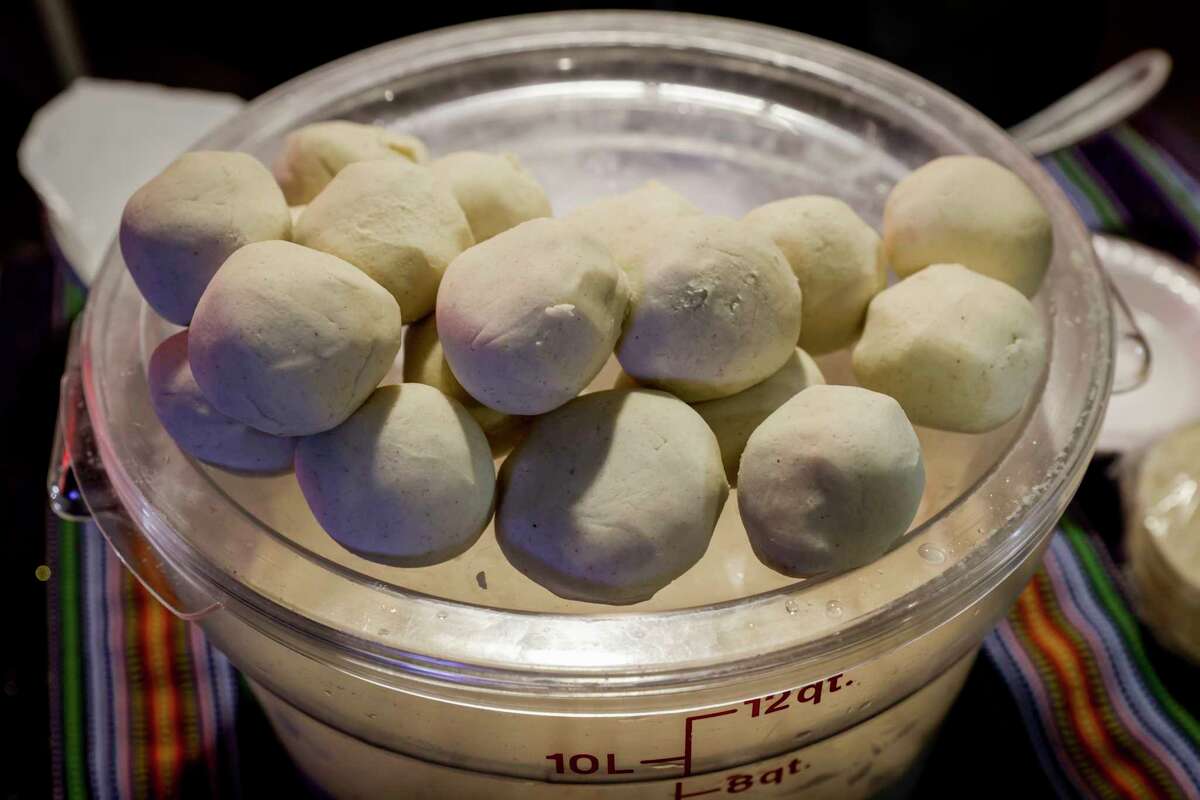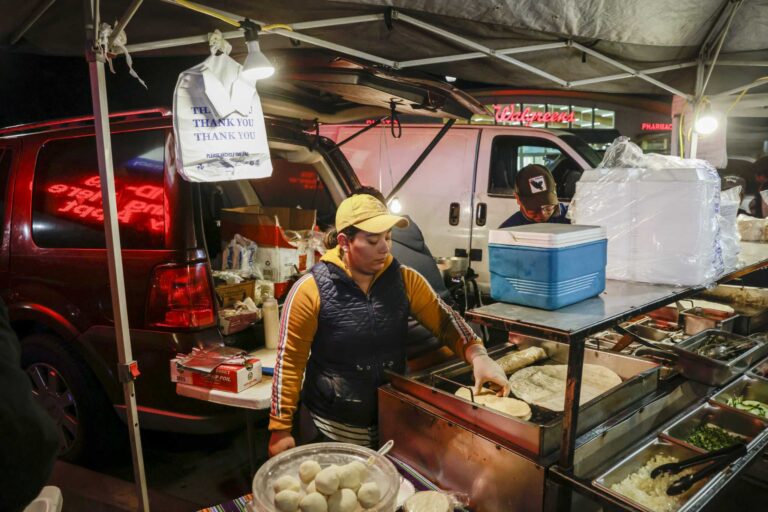When the sun sets in Oakland’s Fruitvale neighborhood, Henry Pablo Matias and his wife, Loyda Pablo, set up a fryer in front of a bus stop, crisping chicken and thick potatoes to order. The smell of the piping hot papas con pollo, a classic Guatemalan food, wafts through the air enticing nearby pedestrians.
When he moved to Oakland 10 years ago, Matias said, there were virtually no food options or stores that catered to his community. But these days, he’s not alone. By early evening the streets of Fruitvale come alive with many Guatemalan food stands. Their new numbers reflect just how much Fruitvale’s Guatemalan population has grown, a shift that began within the last decade but is now more visible than ever.
If you listen carefully, you’ll notice the customers and entrepreneurs who run these stands aren’t speaking Spanish, but Mam, the Indigenous language of the Mam people, a Mayan subgroup from western Guatemala. The recent influx of Guatemalans is made up of many Mam people seeking opportunity and escaping economic instability, severe drought and flooding, as well as agricultural devastation caused by these climate disasters. Compounded by constant anti-Indigenous persecution, the Mam people who come to Oakland say they have moved here out of necessity.
Fruitvale’s Mam community has thrived thanks to social programs — many of which recognize the importance of integrating the Mam language into their services — and strong efforts by young Mam leaders and community organizations to ensure their culture is not only celebrated here but preserved for a new generation.

Food is one of the most palpable ways to sense the Mam community’s presence. Many of these street stands started up during the pandemic, a time when there has been less enforcement by local officials, according to Oakland City Councilmember Noel Gallo, whose district includes Fruitvale.
Moises Perez, a Mam community member, came to California 15 years ago after fleeing violence in Guatemala. Two months ago, he opened a shop in Fruitvale selling sweet breads, racks of Central American goods and, on occasion, chuchitos (tamales).
Pastor Manuel Martin occasionally sets up a stand on Foothill Boulevard for fried chicken and rice tamales wrapped in banana leaves. His daughters, who used to work in food in the Guatemalan city of Huehuetenango, take care of the cooking while he handles the money. Martin spends most of his time leading a church congregation of 50 people, where he gives part of the service in Mam, but sometimes he needs supplemental income.

Edwin Mancilla fries chicken while serving Guatemalan food with his family a part of the food stand Shucos Magi in Fruitvale. Food is one of the most palpable ways to sense the presence of Guatemalans in the area, many of whom are Mam people, a Mayan subgroup from western Guatemala.
Brontë Wittpenn/The Chronicle“When there’s no work, or we need to make rent, we do this,” said Martin. He left his hometown, he went on, because “there are no jobs in Guatemala.”
Gallo and Mam language interpreters told The Chronicle that Mam people likely settle in the neighborhood because of Fruitvale’s many social programs.

Brontë Wittpenn/The Chronicle

Brontë Wittpenn/The Chronicle
Top: Cynthia Solorsano rolls hand-made tortillas at a food stand known as Shucos Magi, owned and operated by Maria Rodas, known as Magi, and her family in Fruitvale. Above: Balls of dough for tortillas (left) which Solorsano (right) cooks by hand. By early evening the streets of Fruitvale come alive with many Guatemalan food stands like this one. Photos by Brontë Wittpenn/The Chronicle
One apparent need in the community is legal aid, said Normal Calmo, a cultural liaison and Mam interpreter for nonprofit Centro Legal de la Raza, which helps Mam people with asylum cases. When she first got to Fruitvale in the early 2000s, she said, Mam interpretation was near impossible to find. “They feel more secure when there’s someone who speaks their language,” said Calmo, who began working as an interpreter in 2014.
Spanish is not the first language for most Mam people. That’s why interpreters are crucial when it comes to census outreach, which helps secure funding for social programs, said Henry Sales, a Mam community leader and interpreter.
The Mam population is difficult to count in a census, as The Chronicle reported in 2020, citing estimates that the number of Mam people living in Oakland was around 10,000. Sales thinks the actual number is likely much higher, perhaps about 20,000, in the greater Bay Area.

Brontë Wittpenn/The Chronicle

Brontë Wittpenn/The Chronicle
Left: Edwin Mancilla fries chicken at his family’s food stand. Right: From left, Leidy Solorsano, 7, Mia Rodriguez, 6, and Jonathan Rodas, 11, enjoy tacos. Photos by Brontë Wittpenn/The Chronicle
Mam people have likely chosen the Bay Area, Sales suggested, based on their networks of support. “Wherever there’s a community (that’s) already established, that’s where people like to go,” he said. “That means the community is there; that means the culture, the language, the food, the tradition, clothes are there.”
Other community organizations in and around Fruitvale — such as health center La Clinica, cultural center Peralta Hacienda Historical Park and grassroots group Homies Empowerment — have hired or work closely with Mam interpreters to better serve the community. Some have even learned the language.
“Mam is the No. 3 language in our clinic after Spanish and English,” said La Clinica health care provider Ken Marriner, who is enrolled in Sales’ Mam language course. “We have enormous numbers of Mam-speaking patients.”

A truck-load of pumpkins, gourds and other vegetables for sale in Fruitvale. The recent influx of Guetemalan residents to the area has made the neighborhood a hub for evening food vendors.
Brontë Wittpenn/The ChronicleWith Homies Empowerment, translator Santa Teresa Ramirez has been trying to get the word out about less well-known programs for Mam people, like food and diaper distribution.
Last summer, Peralta sponsored a Mam festival. Celebrants gathered in brightly colored, embroidered traditional dress to share native folktales and stories of hardship related to the Guatemalan Civil War, which lasted from 1960 to 1996. Peralta executive director Holly Alonso said these recollections can have a “healing effect.”
Community leaders like Sales say it’s important to share difficult stories with the next generation. We “say ‘we’re here’ when we do these types of festivals. We tell kids, ‘Hey, do not forget who you are because (we are) depending on you,’” he said. “You have to tell your children how beautiful we are.”
Fruitvale wasn’t always a Latino neighborhood but change is baked into its history. Once a hub for European immigrants, it became a predominantly Black neighborhood in the 1950s, then Mexicans arrived in the ’60s seeking work. It has long been a place with strong community involvement, said Gallo, who recalls often seeing Chicano Movement figures in the neighborhood. Those efforts led to the foundation of community-based organizations that have lasted several decades — and play pivotal roles today in integrating the new Mam population.

From left, Kalani Robles, 15, kisses Gio Zapien, 16, while waiting for fried chicken and fries at a food stand in Fruitvale. Papas con pollo, a classic Guatemalan food, is readily available in the neighborhood thanks to an influx of Guatemalan immigrants.
Brontë Wittpenn/The ChronicleBut Matias, who runs the fried chicken stand, has a different theory for why the Mam community has chosen Fruitvale.
“We love the climate,” Matias said with a laugh. “It’s very similar to Guatemala.”
Cesar Hernandez is The San Francisco Chronicle’s associate restaurant critic. Email: [email protected] Twitter: @cesarischafa



